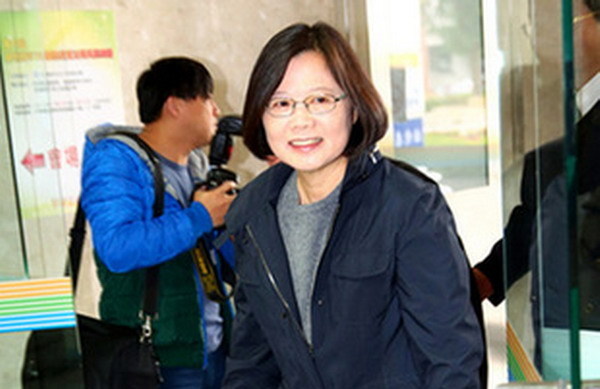
File photo of Taiwan DPP chair Tsai Ing-wen.
Taiwan is expected to be on the agenda when U.S. President Barack Obama meets with his Chinese counterpart Xi Jinping next week. Some are increasingly nervous about the possibility of a Democratic Progressive Party victory in Taiwan's forthcoming leadership election. And since DPP's Tsai Ing-wen appears to be pulling away from the pack, should Washington share Beijing's anxiety over a possible DPP win?
Even if the DPP wins in 2016, it will not be its first win in a major political campaign. In 2000, Chen Shui-bian, the DPP candidate, was elected leader - also in a three-way contest - and his track record is not reassuring.
During his tenure, Chen engineered a series of "surprises" that infuriated former U.S. president George W. Bush's administration. The "bombshells" included inflammatory statements about Taiwan "independence" and controversial calls for island-wide referendums and a new "constitution". American officials viewed Chen's moves as irresponsible, provocative and destabilizing, and warned that the U.S. is not required by law to defend Taiwan.
Given the DPP's checkered history, it came as little surprise when Washington voiced doubts about Tsai's candidacy during her faltering 2012 election bid. And it explains why she is now trying to distance herself from the Chen administration. In February 2015, she even declared: "I am not Chen Shui-bian."
If Tsai is not Chen, who is she?
Tsai often "flip flops" on issues or embraces ambiguous positions. A key example is her refusal to endorse the "1992 Consensus", an arrangement whereby the Chinese mainland and Taiwan have a consensus on one China, but each side holds its own interpretation of what it means. Her stance is worrisome because the consensus has led to an astonishing reduction in tensions between the Chinese mainland and Taiwan, thereby promoting regional peace and stability. Tsai seeks to reassure voters by claiming she supports the "status quo" and will handle relations with the mainland in accordance with "the will of Taiwan residents" and Taiwan "constitution". But these pledges mean different things to different people.
"Pro-independence" activists interpret Tsai's position to mean there will not be reunification. Others, however, contend that she will continue the trend of greater cross-Straits integration. Tsai's lobbyists have even claimed her policy is almost identical to that of the Kuomintang. This ambiguity confuses everyone.
Tsai's policy toward the mainland is important to Americans because the U.S. is Taiwan's primary security partner and the only country that "might" provide it with military support in a crisis. Whether or not Tsai adopts a vague position toward other issues would be her concern. But her approach to the mainland should concern all Americans - especially the U.S. president.
No one knows which DPP will emerge after the election - the irresponsible party that seeks to provoke the mainland or the new "subdued" party that looks a lot like the KMT. And this is precisely why the Obama administration ought to be nervous.
Public opinion polls conducted by the Chicago Council on Global Affairs in 2014 reveal that an overwhelming majority of the American public (71 percent) opposes sending troops to defend Taiwan.
Unfortunately, it is unlikely that Tsai will state plainly how she plans to approach relations with the mainland before the January election. Political analysts speculate that any answer will cost her votes. So, ambiguity does have its advantages.
But the global community will rest easier if Tsai can make one unambiguous pledge. During an interview with CNN's Christiane Amanpour in May 2010, Ma Ying-jeou, then Taiwan leader, promised that, "we will never ask the Americans to fight for Taiwan".
Given the stakes involved, Tsai might be asked to make the same vow. Of course, she could "flip flop" on the issue later. But the largely symbolic move might help reassure Washington and Beijing that the DPP really has morphed into another KMT as claimed by its lobbyists - one might even call it "KMT light."
The author, Dennis Hickey, is distinguished professor of Political Science and director of the Graduate Program in Global Studies at Missouri State University. He is not affiliated to any party or organization in Taiwan, and the opinions expressed in the article are his own.


















































